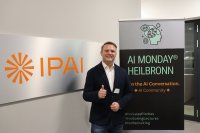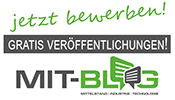Mittelstandspresse
03.05.2024
What prompting has to do with painting
Heilbronn, 03.05.2024 (PresseBox) - AI experts discussed prompting at "AI Monday" at the Heilbronn Innovation Park Artificial Intelligence (IPAI). Also on the podium: Johannes Gölz, research associate at the TUM Campus Heilbronn.
The great thing about the "AI Mondays" is that so many different people come together. And so Johannes Gölz, research associate at the Center for Digital Transformation (CDT) at the TUM Campus Heilbronn, found himself in an illustrious group as a panelist at the latest event in the series: In addition to the doctoral student at the chair of Jens Förderer, Professor of Innovation & Digitalization, the panel also included Claudia Finkbeiner, Professor of Foreign Language Research and Intercultural Communication at the University of Kassel, Dorothée Töreki, owner of the consulting service provider "Denkräume im Digitalen", and Rebecca Rutschmann, founder of the Coaching and AI company "evoach". "AI Prompt Engineering" was the topic of the evening, which was moderated by Dennis "The Alaskan" Kline. The participants on the panel contributed a variety of perspectives: "Show people the benefits of AI for their daily lives and it will increase their motivation to engage with it," was Gölz's hopeful thesis, for example.
Less diversity or more creativity?
Finkbeiner was less optimistic in her response to an audience member's question about the consequences of using AI language models such as ChatGPT for language and creativity: "I expect a greater dying of smaller languages," said the linguist. She fears a general loss of language and is concerned about today's children and young people, whose brains need to be continuously trained in order to develop.Rutschmann was also aware of the risk of standardization. In terms of creativity, however, she also saw a great opportunity "for language models to trigger our humanness and make us want to write even more". Good communication skills will remain important in the future. The rule of thumb for prompts is: "The shorter, the better." Then you get a short, understandable result from the language AI. Good prompts generate good results – at least that was the consensus that evening. One audience member compared the art of prompting to painting. However, presenter Kline explained that it is not that easy if the result is actually to be a picture: It had taken him an hour to get a halfway usable depiction of a boy selling flowers from the image AI Dall-E. This did not surprise Töreki: "An experienced painter would specify the lighting conditions and facial expression in the prompt and state whether he wanted a portrait or a full-body image," she said. After all, there is always a gap between thought and result: "The machine cannot read your mind."
Define the goal, reflect on thoughts
Gölz agreed that expert knowledge, especially basic programming skills, could be an advantage when it comes to prompting. However, AI also offers laypeople a great opportunity: "Many people who are not experts have the chance to improve their own skills through AI."In response to Kline's final question about a single tip for better prompting, Gölz advised using the entire context window to provide the AI with as much input as possible. Rutschmann's tip: "Reflect on your thoughts and try to convey them in your prompt.""You need to define your goal and know where you are heading at," said Finkbeiner. Töreki concluded succinctly: "Use AI to learn. Not to get your work done."
Ansprechpartner
Kerstin Besemer
+49 (7131) 26418-501
Über Die TUM Campus Heilbronn gGmbH:
Die Technische Universität München am Campus Heilbronn ist seit dem Wintersemester 2018/19 am Bildungscampus der Dieter Schwarz Stiftung präsent. Schwerpunkte der Programme liegen auf dem Management des digitalen Wandels sowie auf Familienunternehmen. Forschung und Lehre zielen auf einen Brückenschlag zwischen Wirtschaftswissenschaften, Ingenieurswissenschaften und Information Technologies in einem dynamischen, internationalen Umfeld. So entstehen moderne Forschungsfelder, etwa mit Bezug zu Digitaler Transformation und Plattformökonomie, die in den innovativen Unternehmen der Region Heilbronn-Franken, aber auch weltweit Verwendung finden. Die durchgängig englischsprachigen Bachelor- und Master-Studiengänge bereiten auf eine Karriere in technologie-getriebenen Unternehmen vor. Eine intensive Betreuung durch Professor:innen mit internationalem Renommee und kleine, internationale Lerngruppen, machen das Studium am TUM-Campus Heilbronn zu etwas Besonderem.
Datei-Anlagen:

(3 MB)
1463675.attachment
Johannes Gölz was a convincing panelist at AI Monday.

(3 MB)
1463676.attachment
The entire panel (from left): Moderator Dennis Kline, Rebecca Rutschmann, Johannes Gölz, Claudia Finkbeiner and Dorothée Töreki.
- Mehr Infos zu dieser Meldung unter www.pressebox.de
- zurück zur Übersicht
















